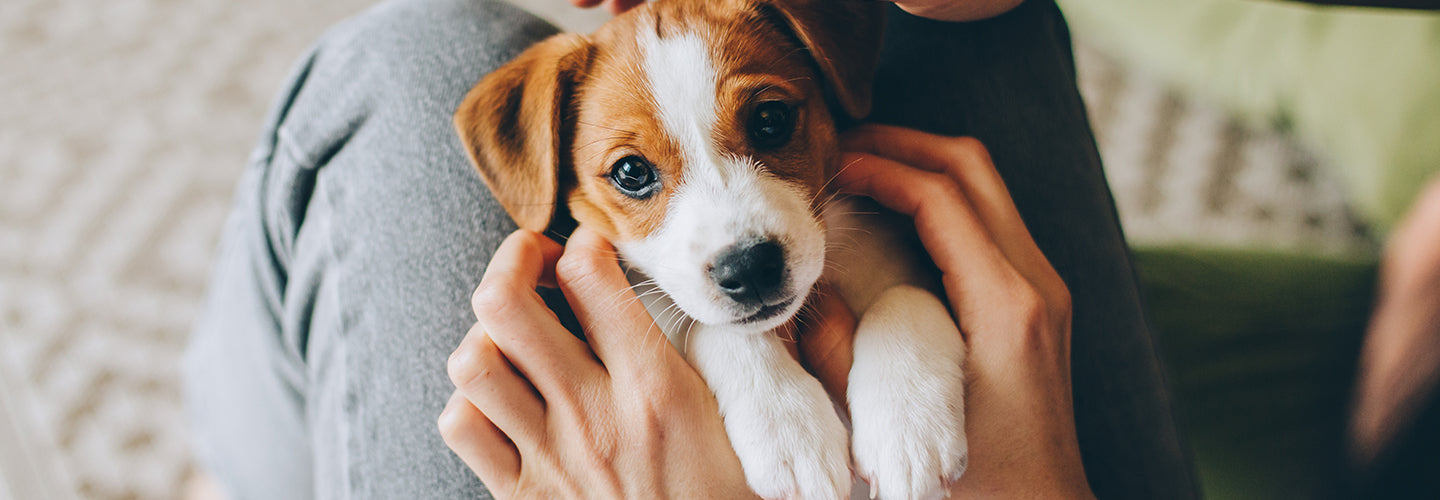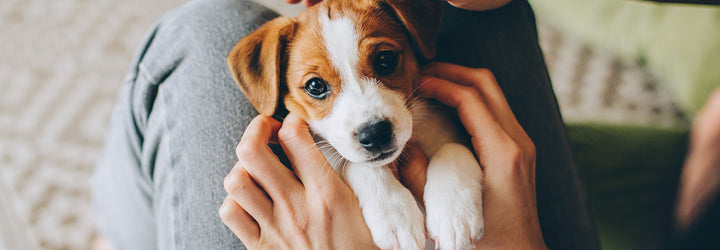

Posted by Jenny Edwards, on
Tiny Paws: Socialising Your New Puppy
Whenever you decide to get a new puppy, it’s important to think about every aspect of training for when they arrive. We know how crucial it is that your dog is socialised in the right way, so one of our training specialist Jenny has put together some advice on how best to help your dog with socialisation and habituation as they join your family.

What is socialisation and habituation?
Socialisation is where your pup is learning about how to interact around other living beings such as humans, other dogs, and other types of pet.
Habituation is your pup learning about their environment. It could be anything around sounds, smells, sight, routine or feel of things. Examples include (but are not limited to)
- The sight and/or sound of doorbells, phones, bin collectors, cyclists, cars, lorries, pushchairs
- The feel of walking on gravel/concrete/lino/carpet/grass/snow.
- The smell of different cleaning materials, foods, animals, past animal markings.
- The sight of other animals, people, new house & furnishings, decorating sights and smells, balloons, planes.
- The lead up to what happens before a walk or someone leaving the house (for example, when you put on a certain pair of shoes, coat, grabs key, phone, lead/harness etc)
When does the socialisation and habituation start?
Bringing the dog home is the start, meeting family and other family pets. If your new dog is meeting a dog already living at home, try to do this on a neutral ground first if possible, when both dogs are inoculated, and it is a safe environment for everyone.
Body language is everything
The ‘polite’ way for dogs to meet each other is to do so in an arc, nose to butt, & not face to face. Face to face can be quite intimidating, or even threatening. Try to read up on some body language before collecting your new member of the family to be able to not only read your new dog better, but also any dog that they may meet. This way you’ll be able to see where he/she is feeling submissive, comfortable, anxious, playful etc.
Cats will probably run and hide for a while, and generally will come to join the newbie in their own time, so make sure they have a safe space in the house with their food water and litter tray, where they can get away when they want to. You can bring the cat to the dog to say hello from time to time, but choose your time wisely, when the dog is quiet & relaxed, so they have the chance to get to know each other.

Socialising your puppy with children
As a new pup owner, it's really important that the children in the house are aware of how they need to conduct themselves around the dog to teach respect & prevent any bites from happening. In particular, not to tug at ears/tails, not to put their face to theirs, not to remove food/chews or bones from them or to disturb them when they are sleeping or in their bed.
Settling your puppy in
Let your new addition get used to his or her new home for a few days before you start to invite friends and family around to meet them. Look at it from their perspective…their whole world has changed. Introduce them to new things/people gradually, so as not to scare them with everything all at once.
Puppies go through a fear imprinting stage, and anything that scares them during this stage can be pivotal in how they react to it in the future, so slow and steady, with lots of reassurance is key.
Praise the good behaviour with reward in the form of puppy treats, puppy toys, or fuss, whatever motivates your dog. You may well find that puppies initially have a 'puppy license' for a while as far as an existing resident older dog is concerned, but eventually this licence will expire, and the resident dog may well tell the pup when enough is enough if they are getting too much.
Once your new dog has had a few days to settle and if there are no behavioural issues to address, you can look at them experiencing new things, people, animals and places with you.
Remember to reward the positive behaviour to reinforce it.
If your pup isn't conforming, don't resort to telling them off. For the pup...you won't be demonstrating leadership credentials by doing this and may well just be adding to the noise they are creating and 'joining in'.
Try and opt for less busy places firstly and build from there. Our big wide world is a pretty unnatural place when you think about it. Vehicles, humans, phones, TV's, radios, vacuum cleaners, bins, lamp posts, even a plastic bag blowing in the wind is not a natural thing and something that could 'spook' them.
If you have any questions about puppy training, our specialists are on hand in store to help with all your new pup needs.
